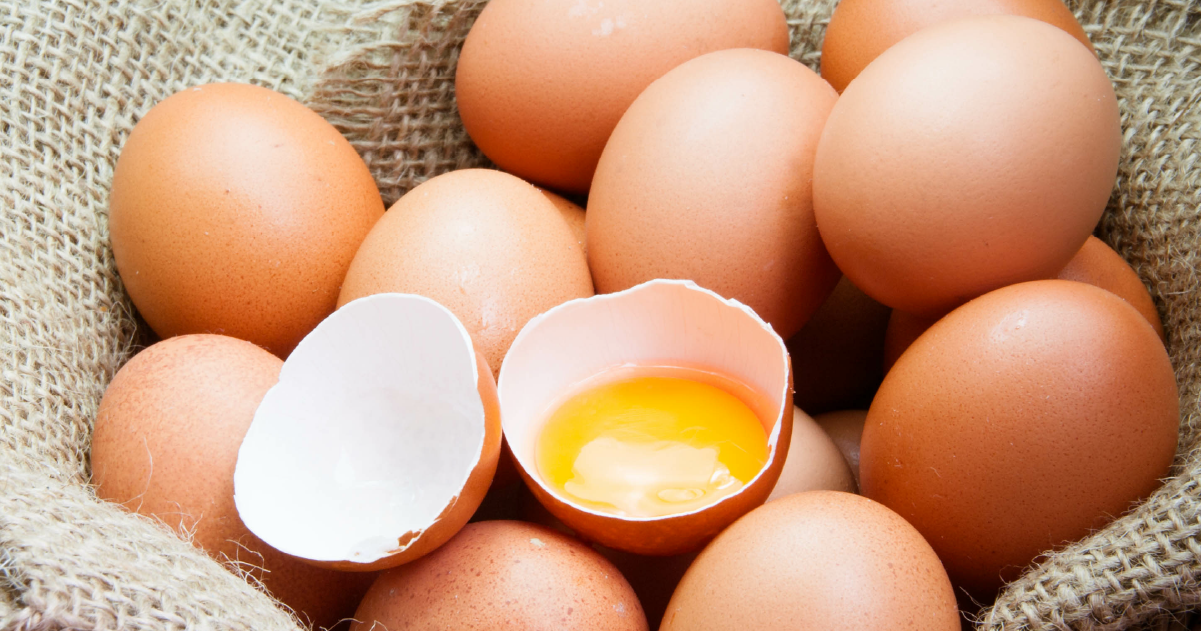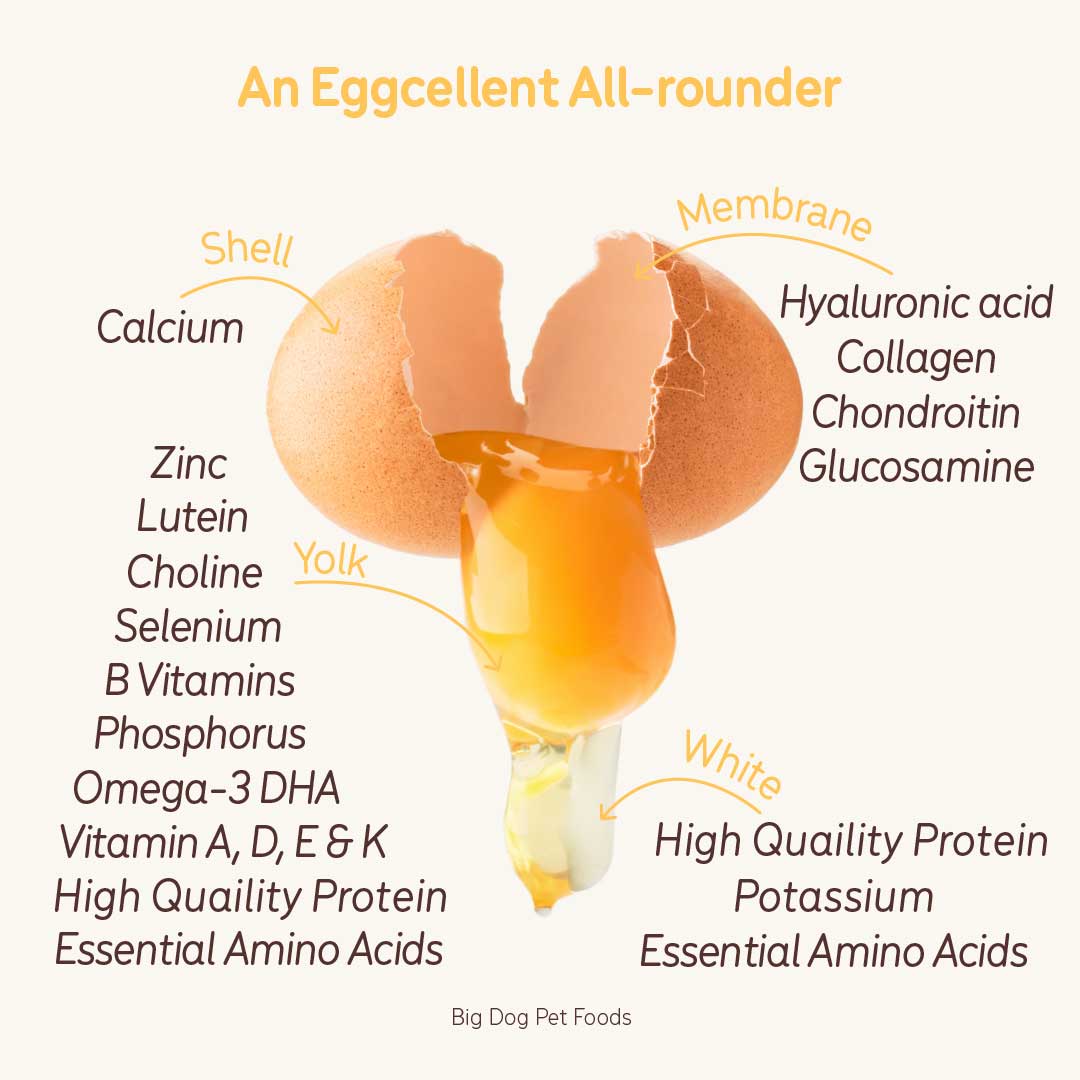Eggcellent Nutrition Advice

By Dr Duncan Houston, Veterinarian and Pet Nutritionist

Eggs have been a controversial food addition to a dog’s diet in recent times, some saying it makes coats shine whereas others worry about everything from bacteria to allergies. For the best part, we’re beginning to understand that eggs are actually a cracker of an addition to any diet! So let’s not yolk around and waste another albuminute (albumen is the scientific term for egg white… that was a vet joke, sorry, but it was pretty eggceptional!) Ok I’ll stop… shell we bEGGin? Eggain, couldn’t resist. Alright serious scientist time!
Let’s start our journey back to before humans and canines roamed the suburban streets and look at what the historic wild dog ate. Well actually both historic and present canids are instinctive scavengers, which includes sniffing around for eggs, even digging them up, eating the entire thing, shell and all. Hence, for millennia this has been a vital part of their diet giving them essential vitamins, minerals, proteins and fats.
Despite the differences between dogs and their predecessors, the research only shows changes to the expression of certain genes. These are mainly related to starch digestion and this is understandable given the vast majority of modern companion animals are being fed a processed (kibble) diet, relatively high in carbohydrate content, generally over 50%. What the research doesn’t show is if these changes were beneficial or just purely necessary adaptations of their genome based on what they were eating[3].
What hasn’t changed, as I and many other medical professionals have noted, is that the digestive system between domestic dogs and wolves, as well as most other canids, is anatomically exactly the same. Hence, domestication over the past 20,000 - 40,000 years has not had as significant of a change as the vast majority of pet food companies would have you believe.
There is a plethora of information about this heated topic, however it is beginning to become clear that research into the ideal diet for dogs is now swaying more towards having a diverse microbiome for an optimal immune system and in turn longevity. I feel the starch digestion topic is now being left behind and research is focussing on gut bacteria, which is pretty much following trends of the human market.
We do find out here though that the key, it seems, to obtain a diverse microbiome generally requires an increase in the number and variance of foods as well as bacteria ingested, along with providing enough prebiotics in a diet. Honestly, this can ideally be sourced through a natural diet where eggs can be a fundamental proponent here.
Eggs are quite literally a “whole” in one, when it comes to our dogs. Dismissing any part means the entire benefits of this superfood may also be missed.
Let’s break down the anatomy of the egg to illustrate this point.
The White
There is a synergy between the white and yolk of an egg. One point to make here is you may have heard of raw eggs causing biotin deficiency, but this is only in isolation and isn’t an issue when the eggs and yolk are consumed together. Egg white includes just over half the protein which can be not just for building muscle but also maintaining it, which can be an issue for older animals; potassium and sodium for maintaining correct body fluid volumes, ideal for muscle function and nerve signalling; as well as a bunch of beneficial vitamins and minerals[2,5].
The Yolk
This part of the egg is full of nutrients including antioxidants, vitamins, minerals, healthy fats (including DHA) and contains almost half the protein of the entire egg! Breaking down the individual nutrients, the yolk of an egg is a great source of:
- Calcium for bone and cartilage development and repair
- Phosphorus for bones, teeth, DNA, RNA, membrane structure and energy production
- Zinc for immunity, growth and development including pregnancy
- Selenium for immunity, metabolism and prevention of oxidative stress
- B vitamins for energy, neurological function and cell metabolism including the critically important B Vitamin, folate, for building proteins, tissue growth and cellular function
- Vitamin A for proper organ function, immunity, vision and reproductive health
- Vitamin D is a big one for immunity, calcium and phosphorus regulation, healthy teeth, bones and muscles
- Vitamin E for immunity and is also a powerful antioxidant
- Vitamin K for proper clotting of blood and bone metabolism
- DHA, a healthy omega-3 fatty acid, for fighting inflammation, heart disease, eye disease, muscle recovery, neurological development and repair, glossy coat, perfect skin and improved cognitive function
- Choline for brain and neurological function, a healthy heart and can also boost metabolism… by the way eggs have one of the highest concentrations of choline when compared to other foods and the choline from fresh, raw eggs is a fundamental ingredient of any raw diet, if you don’t want to be supplementing with any synthetic nutrition[2,5].
Egg yolks also have a bunch of other beneficial vitamins, minerals, fats, antioxidants and much more for a healthy happy pupper! So no joke, don’t forget the yolk!
The Shell
Even though we as humans don’t tend to eat the shell, it’s an amazing source of calcium. You can feed the egg whole or blended, including the shell! By adding pulverised / blended eggshells in your dog’s diet you’re making it even more bioavailable / absorbable to the body, hence your pooch is taking in these benefits directly in their most natural form. This is vastly nutritionally superior when compared to a synthetically derived calcium powder.
The Membrane
Several articles have shown that daily supplementation of eggshell membrane into a diet can, and has, reduced joint pain, stiffness and arthritis. This may not seem like a big thing for a young, healthy and vibrant animal but supplementation over the course of their lifetime, especially during development, can and will support their joints. My professional opinion as a vet has, and will always be, that prevention is better than cure[12,13].
Now we’ve pretty much been through all the things that eggs contain that are beneficial, but by also having a diet high in protein as well as fat with a lower in carbohydrate content, where eggs have zero carbohydrate by the way, your dog can feel fuller for longer and maintain an appropriate body weight, or even lose some weight, if required.
Most natural pet food company diets are close to 5% in carbohydrate content and are the perfect meal plan for an overweight and / or diabetic pet! By reducing the spike of glucose in their blood after a meal with a lower carbohydrate content, when compared to high carbohydrate diets like most processed dry foods (kibble), less insulin is needed for diabetic animals. This in turn means their long-term prognosis is much better and in ideal cases can sometimes be reversed! Also, these diets generally allow for less fat to be stored over time as protein and fat are utilised as energy sources. Hence, the animal can theoretically use the current fat they hold better for energy production as their body is adapted to fat burning and gluconeogenesis. Although, technically they still need to be in a caloric deficit for this to happen, but these diets provide higher satiation, so they feel fuller for longer.

What I do get asked a lot is “Isn’t chicken and aren’t eggs the most allergic foods to dogs?”
Well actually if your dog is allergic to chicken it’s not necessarily allergic to the egg[14], but I’m not going to lie here your dog can certainly have an allergy to specific chicken meat and egg proteins, although these allergies are rare[15]. Actually, one research article summarised numerous studies and found several carbohydrate sources, especially wheat, to be right near the top for the most common allergens, so it’s not always from animal sources[7]. Most animals may just have an intolerance to a specific protein rather than an allergy so in small amounts it generally won’t cause any significant issues. Other adverse reactions include idiosyncrasies, pharmacological reactions, poisons and enterometabolism if we want to list them all. There is some promising research in humans with oral immunotherapy treatment showing that ingestion of tiny amounts of a specific allergen can possibly lower the allergic response over time[4,14,15]. However, consult with your holistic veterinarian about the specific situation you are in because every case is different.
If you’re worried about eggs being included in your pet’s diet then I wouldn’t avoid them unless you’ve had a specialist veterinary dermatologist diagnose an allergic response or you have completed a strict elimination dietary trial that has been confirmed with rechallenging and provocation to a single or several specific chicken muscle tissue, egg yolk or egg white proteins – eggs are simply too beneficial to rule out on a hunch without evidence to substantiate a true allergy[6].
If you have a concern about eggs and their role in food allergies, it’s important to know that genuine food allergies and intolerances in dogs generally arise before 12 months and cats 4 to 5 years. By exposing them to a variety of foods when they are young you can assist them in the prevention of developing allergies and intolerances before they are fully grown, although some allergies can be outgrown with time anyway[6,9,14,15].
It’s important to acknowledge that one of the biggest culprits in food-based allergens for pets actually isn’t the whole food itself, it’s the processed version of it. Highly processed foods can change how a protein, or allergen, is presented to the body (whether good or bad) and many of these (e.g. dry food / kibble and certain treats) have discrepancies between their ingredients and their labels[1,6,8]. In some instances (i.e. removing an allergenic component from milk protein can allow an IBD case to tolerate the end product) there can be a positive end result with different processing methods, whereas a negative end result is that heat treatment and processing can result in gastrointestinal tract related issues and also possibly affect the carcinogenicity of the food.
Where I have a patient with a suspected protein allergy (where more common allergens including environmental allergens have first been excluded) I will trial limited protein diets initially, for a 6 to 12 week period in adults and a 3 week period in immature animals, rather than using highly processed and synthetic single protein products or a hydrolysed kibble to treat an undiagnosed hunch. Although, I will note that there is still no general consensus for the dietary trial period[10,11]. If the body is still responding negatively to this after the food trial, then a stricter approach is warranted. So, depending on the age of the animal I will adjust to a natural single protein diet to cater for their needs as well as tailor it to what suits the client in terms of their commitment. If the client is unable to do this in a natural manner, then that is when I will offer hydrolysed / processed products for a trial. I will also do this for difficult cases as one; an owner needs to be committed so ease of use of a product can be vital, and two; if we are struggling to work out a proper natural treatment with severe / difficult cases then I will prescribe medication and go towards processed options that have trusted research backing them.
Ultimately, there isn’t a single diet that works for every animal, but with the current range of natural limited protein products on the shelves there are several that you as a pet parent can start with.
Proteins, such as within chicken meat and their eggs, aren’t the only sources of allergies and intolerances. They can present based on how products are processed as well as what preservatives have been used[16]. Several of the natural food brands use preservation methods rather than adding preservatives, such as freezing or freeze drying, which also means that the healthy fatty acids aren’t oxidised and don’t become inflammatory. Other benefits to note are that with freezing the moisture is locked in but with freeze drying products you can add as much liquid in as you want which I honestly love! Especially for cats, or any animal, with kidney disease. Lastly, the beneficial bacteria, probiotics, aren’t harmed as much through these methods so your pet is getting that vast range of valuable bacteria for boosting their microbiome and in turn excelling their immunity and hopefully longevity.
References:
1. Alvarez, P. and Boye, J., 2012. Food Production and Processing Considerations of Allergenic Food Ingredients: A Review. Journal of Allergy, 2012, pp.1-14.
2. American Egg Board. 2020. Egg Nutrition Facts - American Egg Board. [online] Available at: <https://www.incredibleegg.org/nutrition/egg-nutrition-facts> [Accessed 1 September 2020].
3. Axelsson, E., Ratnakumar, A., Arendt, M., Maqbool, K., Webster, M., Perloski, M., Liberg, O., Arnemo, J., Hedhammar, Å. and Lindblad-Toh, K., 2013. The genomic signature of dog domestication reveals adaptation to a starch-rich diet. Nature, 495(7441), pp.360-364.
4. Caubet, J. and Wang, J., 2011. Current Understanding of Egg Allergy. Pediatric Clinics of North America, 58(2), pp.427-443.
5. Eggs, A. and Vitamins, N., 2020. Nutrients & Vitamins In Eggs: 11 Different Nutrients. [online] Australian Eggs. Available at: <https://www.australianeggs.org.au/nutrition/nutrients-and-vitamins/> [Accessed 1 September 2020].
6. Gaschen, F. and Merchant, S., 2011. Adverse Food Reactions in Dogs and Cats. Veterinary Clinics of North America: Small Animal Practice, 41(2), pp.361-379.
7. Mueller, R., Olivry, T. and Prélaud, P., 2016. Critically appraised topic on adverse food reactions of companion animals (2): common food allergen sources in dogs and cats. BMC Veterinary Research, 12(9).
8. Olivry, T. and Mueller, R., 2018. Critically appraised topic on adverse food reactions of companion animals (5): discrepancies between ingredients and labeling in commercial pet foods. BMC Veterinary Research, 14(1).
9. Olivry, T. and Mueller, R., 2019. Critically appraised topic on adverse food reactions of companion animals (7): signalment and cutaneous manifestations of dogs and cats with adverse food reactions. BMC Veterinary Research, 15(1).
10. Olivry, T. and Mueller, R., 2020. Critically appraised topic on adverse food reactions of companion animals (9): time to flare of cutaneous signs after a dietary challenge in dogs and cats with food allergies. BMC Veterinary Research, 16(1).
11. Olivry, T., Mueller, R. and Prélaud, P., 2015. Critically appraised topic on adverse food reactions of companion animals (1): duration of elimination diets. BMC Veterinary Research, 11(1).
12. Ruff, K., 2009. Eggshell membrane: A possible new natural therapeutic for joint and connective tissue disorders. Results from two open-label human clinical studies. Clinical Interventions in Aging, (4), pp.235-240.
13. Ruff, K., Winkler, A., Jackson, R., DeVore, D. and Ritz, B., 2009. Eggshell membrane in the treatment of pain and stiffness from osteoarthritis of the knee: a randomized, multicenter, double-blind, placebo-controlled clinical study. Clinical Rheumatology, 28(8), pp.907-914.
14. Tan, J. and Joshi, P., 2013. Egg allergy: An update. Journal of Paediatrics and Child Health, 50(1), pp.11-15.
15. Wills, J. and Harvey, R., 1994. Diagnosis and management of food allergy and intolerance in dogs and cats. Australian Veterinary Journal, 71(10), pp.322-326.

About the Author:
Duncan is a Veterinarian and pet nutrition expert based in Sydney who works mainly as a mobile vet, but also in emergency and general practice. He has a passion for aquatics and nutrition, working with several natural pet food companies for over half a decade.
Triathlon and cycling were integral parts of Duncan’s life where he competed in several different countries taking home numerous achievements. He has always been active and maintains a healthy and exercise induced lifestyle, which he projects onto the animals he treats.
Duncan hopes he can provide you with up to date research and make it relevant to your pets at home. Better to be healthy now and get things right, such as nutrition early, as prevention is always better than cure.
